Existing User Log In
New User Registration
Register for a free account to gain full access to the VGChartz Network and join our thriving community.



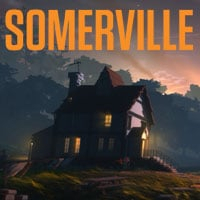

America - Front
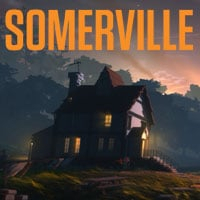

America - Back

Jumpship
Adventure
 11/15/22 Jumpship
11/15/22 Jumpship  (Add Date)
(Add Date) 11/15/22 Jumpship
11/15/22 Jumpship
| Owners: | 0 |
| Favorite: | 0 |
| Tracked: | 0 |
| Wishlist: | 0 |
| Now Playing: | 0 |
It's damn near impossible to avoid connecting Jumpship's debut title to Playdead's LIMBO and INSIDE. Beyond both companies sharing a co-founder, there's a similar skeletal structure between them: paring back gameplay to emphasize atmosphere, art design, and world-building. There are still puzzles to solve, but they're more about a sense of place than firing the brain on all cylinders. And while Somerville finds a few aesthetic and mechanical nuances away from its closest contemporaries, it doesn't have the finesse nor polish of them.
After an opening credits sequence depicting a family driving through the vast countryside – with that Britain-trademarked visual drabness, they arrive at their quaint house. The first character you control is this red-headed toddler as he... toddles around causing some casual mischief. It's nothing compared to the purple spotlights piercing the night sky and artillery fire in the distance (even if the brick walls dramatically reduce the volume). Eventually, your main character, the father, and his wife and dog also wake up to this War of the Worlds. A strange encounter with a crashed pilot causes this nameless dad to go comatose, resulting in his wife and child gone when he comes to. At least the dog stayed.
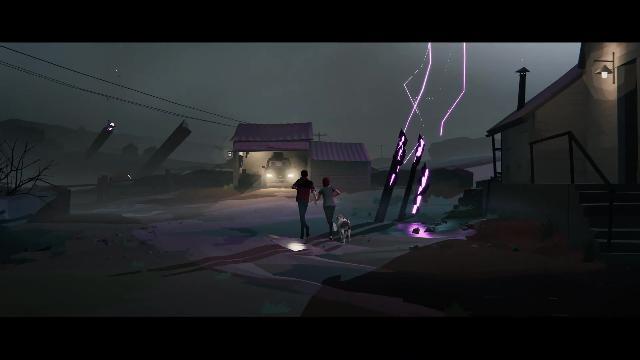
The abrupt, odd greeting from this seemingly-alien pilot gifted this dad with a supernatural power: melting alien matter when channeled through a light source. Something as simple as a dangling ceiling light or car headlamp can transmogrify huge blockades into a puddle of blue-and-black foam pieces (that are somehow drawn towards you when stepping through it). Eventually the inverse becomes true as you channel another power to instantaneously freeze those liquid-blocks in place.
Manipulating these metamorphic substances is the main nuance atop the expected "LIMBO-like" puzzle-platforming. There's no jump button this time around, but the motley mix of plugging into power sources, yanking levers, shoving mine carts, and more are as you'd expect. On occasion, some of these power-oriented conundrums serve as neat gimmicks. More often, they're really just basic pacing mechanisms that don't evolve too far past the starting point. It avoids being directly accused of a walking sim by doing just enough.
Remember how that's framed in the opening paragraph: it's about emphasizing scale and atmosphere. When that mundane night goes to hell, the impact works so well partly because of how the action is framed. Your diminutive stature next to these obelisks hurling two-ton spears from empyrean heights, complimented with crunchy audio design, or its deep-purple tractor beam slowly scanning your surroundings feels truly imposing. Even with the mechanically standard puzzle or chase sequence, it's rewarding when your instincts successfully tell you what to do next – with subtle visual queues guiding your eyes.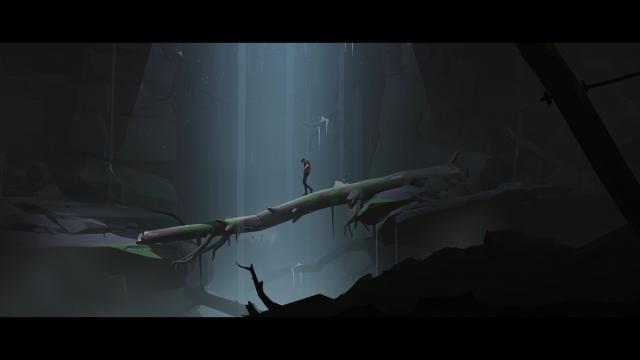
It's a shame those instinctive reactions can be disrupted by the game itself. There are two specific thresholds Somerville mishandles: communication and polish.
Taking after Stela and Playdead's titles (take a shot!), the dialogue-less route is a great way of pulling players further into its visual storytelling. Simple gestures and pantomimes can be enough for players to intuit the current mood or objective. Here, certain solutions seem artificially constraining or hazy in implementation. A couple visual markers can be confusing, given how they subtly blend in. And since another nuance from its contemporaries is its full 3D exploration, it's a shame how underutilized it feels. You can bump up against invisible walls off the beaten path and sometimes the precision to interact with something feels far too finicky.
Those interactive annoyances also feed into its nettlesome technical mishaps. The most glaring example would be random instances where controls simply stop working. A scene transition to the dad falling into a subterranean cavern resulted in him just drowning there, since no control stick nor button prompts worked for me. Certain camera transitions, especially during chase sequences, were disorienting when perspective and directional movement dramatically shifted, along with getting snagged on the geometry. When you add these along with weird visual glitches or buggy moments like when the dog continues running into a wall it all adds up and breaks immersion in discreet ways.
While not as damaging to its reputation, I did wish there was more personality incorporated into the death animations too. When I think back to INSIDE (I know, I know!), one scene that always gets to me is the boy being ravenously mauled by dogs. Why were they so desperate to rip him limb from limb? Regardless of the answer, the detailed visual/audio design compelled you to avoid fail states at all costs. Here, it more often looks like the dad tripped over a tree stump before there's a quick cut to black. Just not to that level with regards to detail.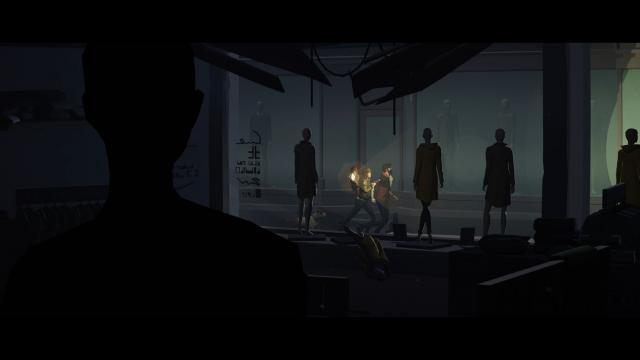
Where detail is slightly more successful is Somerville's storytelling. Credit where it's due: incorporating communication as a main theme to a non-verbal game is interesting. Even the collectibles here are strange alien orbs only talking through beeps and flashes of color; sometimes they're directly helping you progress while other times it's tough to makes sense of them. While I won't go into detail, the finale's best ending hinges on language in a unique way. I still dislike some narrative choices made, but there are genuinely good moments where visual storytelling, the lovely low-poly art work, & Dominique Charpentier's plaintive soundtrack come together.
The problem is those better moments are like sprints during a marathon. The dad can't help but feel like an empty cipher. The booming alien sound effects are quite detailed, but there's not as much of a character there for him. The one distinguishing factor I remember is his incessant coughing during one chapter. Without any kind of authentic personality, the protagonist feels more like an AI processing emotional stakes. Hell, you (currently) can't even pet the dog; only the child can at the beginning. That oversight annoys me to no end, especially for the journey both endure.
The narrative also relies too heavily on mystery for the sake of mystery. It has a habit of bringing in new characters, but never properly conveys their roles in the grand scheme of things. You're just conveniently shuffled along from intense beat to intense beat. It leaves plenty up to interpretation, but without enough clarification. It can feel rewarding to see players have disparate views about a creative work, but Jumpship leans too far towards the vague & distant, souring interest at replaying or bouncing potential explanations within message boards.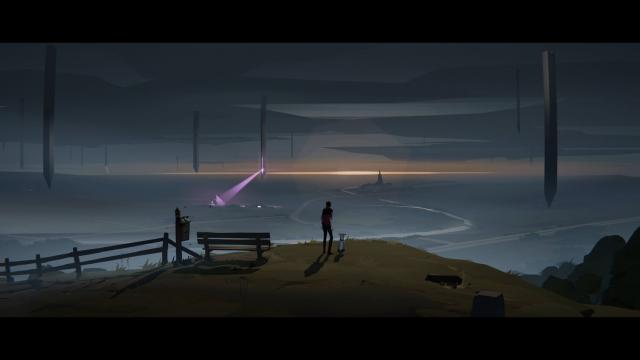
If I had one all-encompassing diagnosis of Somerville it would be termed “plagued by detail.” When storytelling, atmosphere, and albeit rudimentary gameplay complement each other it can lead to some fascinating moments. But then, you see the cracks begin to form outside of those: under-polished instances when odd bugs occur, the way some puzzles are clumsily handled, the overly-vague story taking confusing creative turns, not being able to pet the dog (currently as the dad), and so on. Those foundational fissures kept propagating the further I went into this 5-hour journey. The fault isn't with Jumpship utilizing Playdead’s successful template, but in forgetting to incorporate the pedigree alongside it.
Contractor by trade and writer by hobby, Lee's obnoxious criticisms have found a way to be featured across several gaming sites: N4G, VGChartz, Gaming Nexus, DarkStation, and TechRaptor! He started gaming in the mid-90s and has had the privilege in playing many games across a plethora of platforms. Reader warning: each click given to his articles only helps to inflate his Texas-sized ego. Proceed with caution.









